Personal and Professional Skills for Management: Conflict & Coaching
VerifiedAdded on 2023/06/14
|10
|2778
|442
Essay
AI Summary
This essay examines the critical roles of conflict management and coaching techniques in professional management. It highlights how effective conflict management, involving clear communication and active listening, can transform workplace disputes into opportunities for improved productivity and team leadership. The Khun and Poole model is discussed as a method for resolving conflicts through distributive and integrative approaches. Furthermore, the essay explores various coaching techniques, such as active listening, asking questions, and collaborating, which foster trust, open communication, and personal development among employees. These techniques aim to align employee goals with organizational objectives, enhance job satisfaction, and promote a positive work environment. Emotional intelligence is also emphasized as a key component in understanding and addressing employee stress, ultimately contributing to a more agile and successful team.
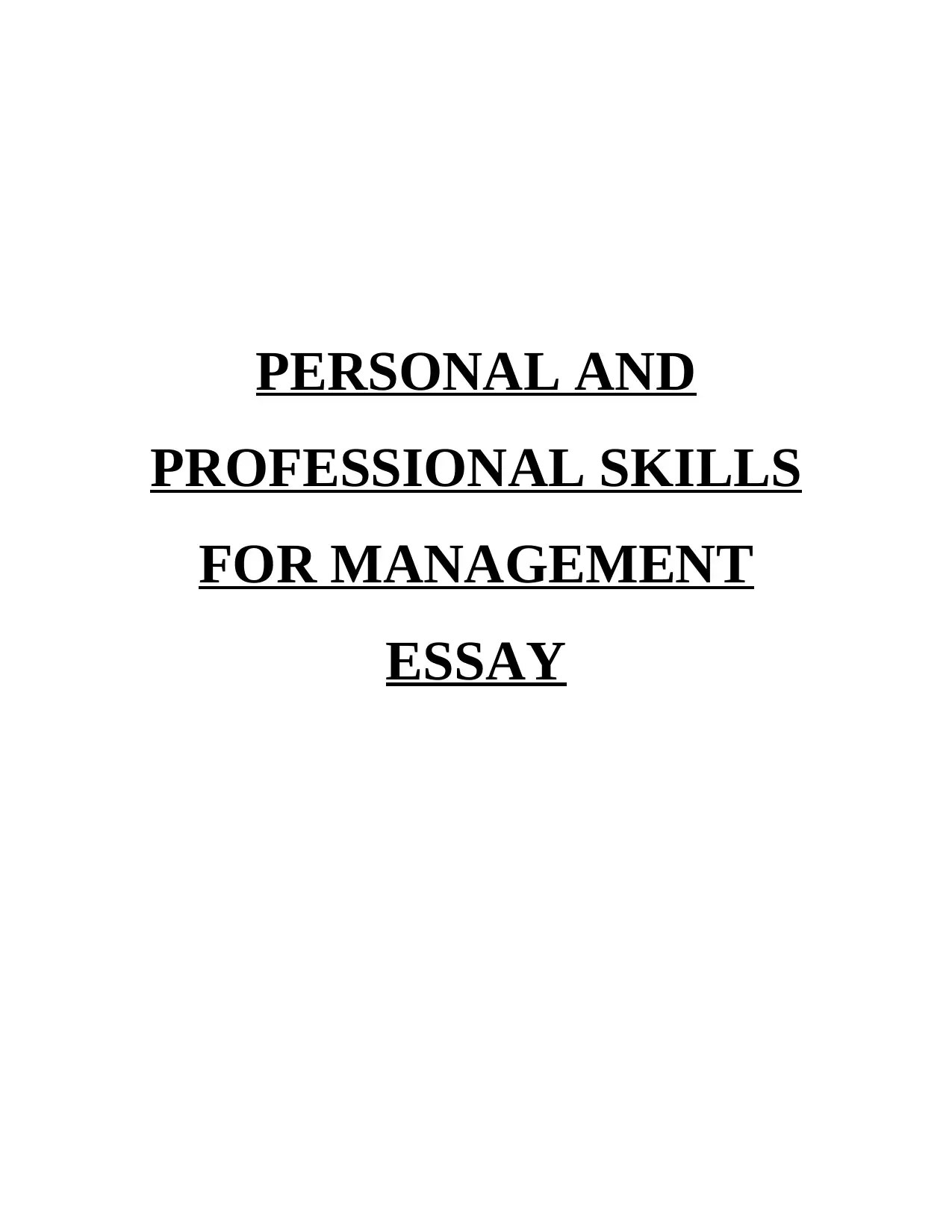
PERSONAL AND
PROFESSIONAL SKILLS
FOR MANAGEMENT
ESSAY
PROFESSIONAL SKILLS
FOR MANAGEMENT
ESSAY
Paraphrase This Document
Need a fresh take? Get an instant paraphrase of this document with our AI Paraphraser
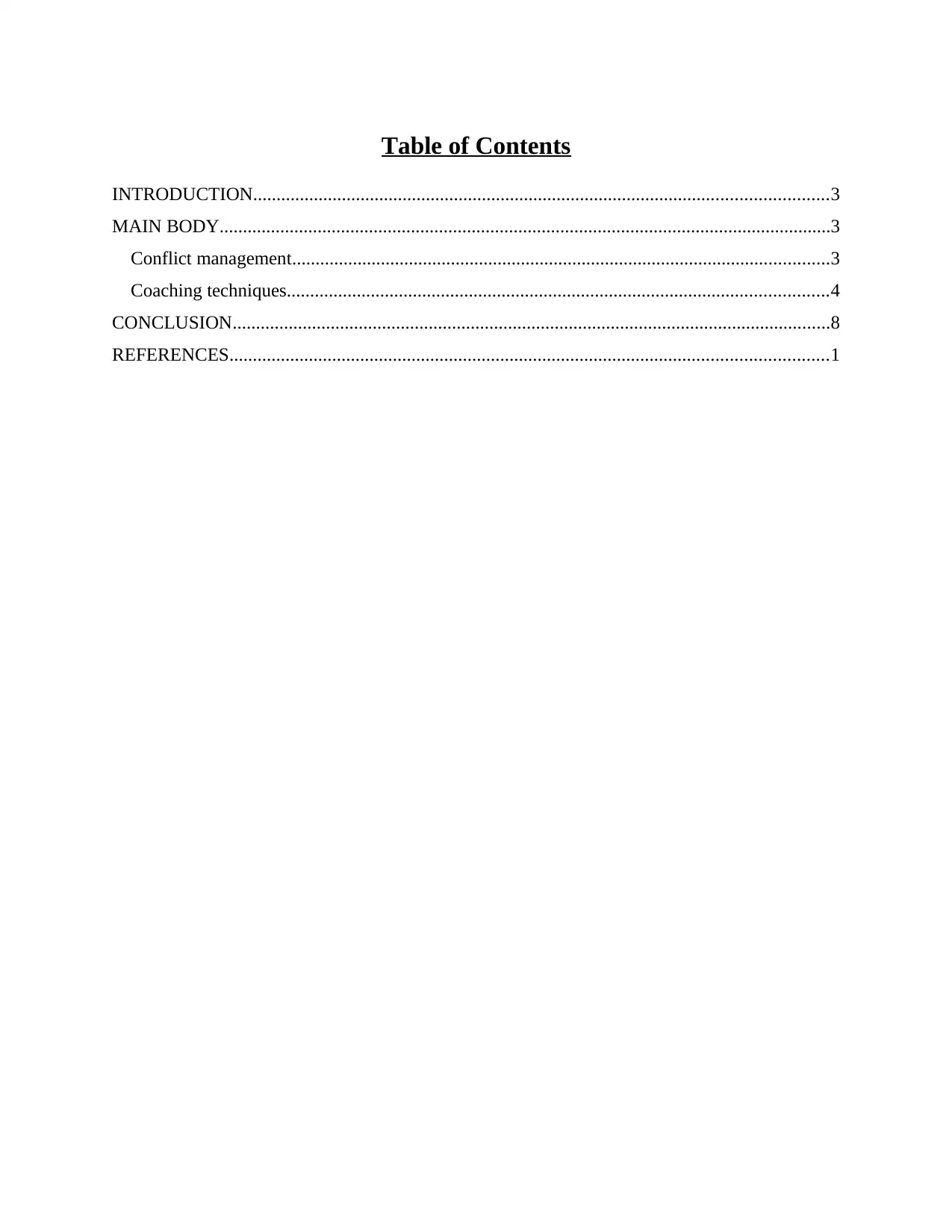
Table of Contents
INTRODUCTION...........................................................................................................................3
MAIN BODY...................................................................................................................................3
Conflict management...................................................................................................................3
Coaching techniques....................................................................................................................4
CONCLUSION................................................................................................................................8
REFERENCES................................................................................................................................1
INTRODUCTION...........................................................................................................................3
MAIN BODY...................................................................................................................................3
Conflict management...................................................................................................................3
Coaching techniques....................................................................................................................4
CONCLUSION................................................................................................................................8
REFERENCES................................................................................................................................1
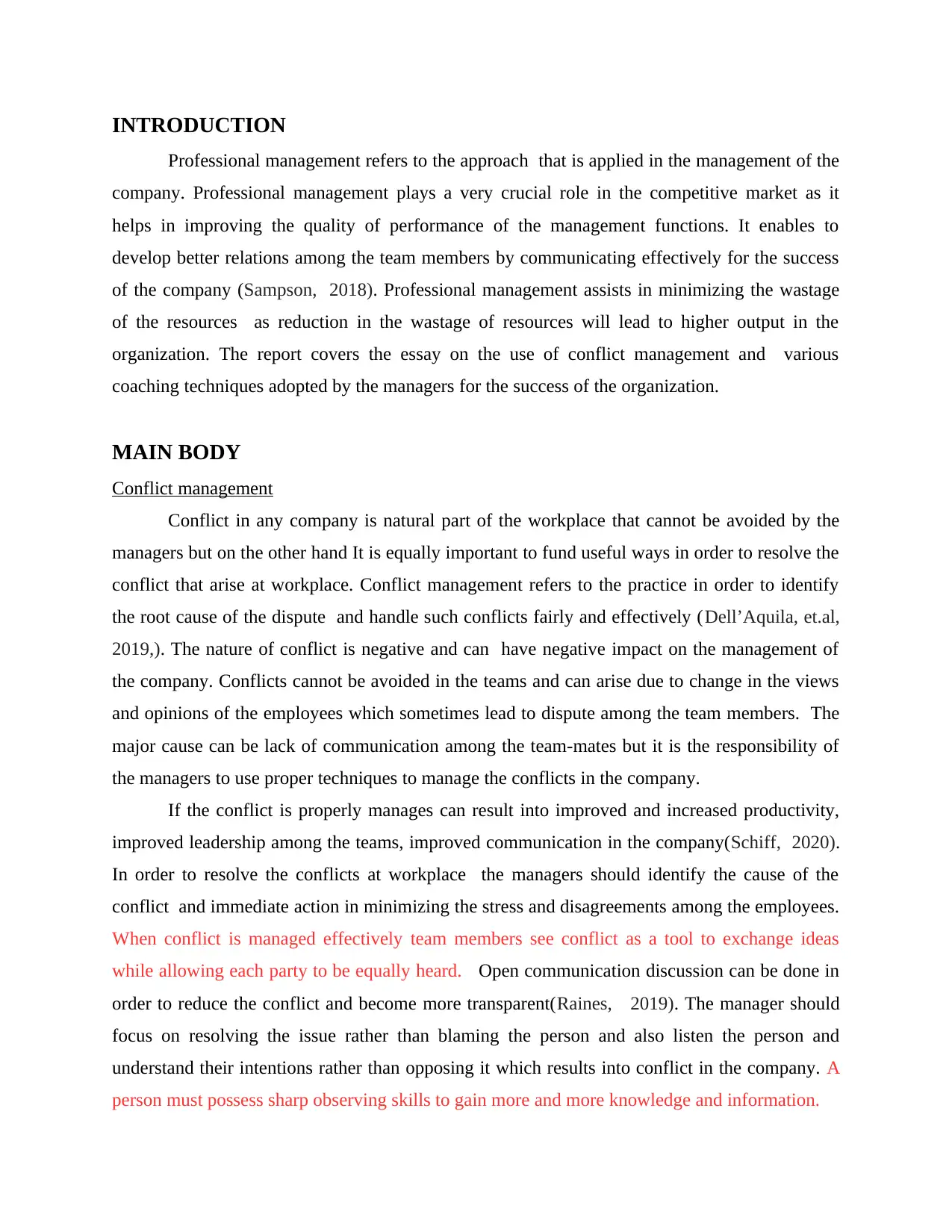
INTRODUCTION
Professional management refers to the approach that is applied in the management of the
company. Professional management plays a very crucial role in the competitive market as it
helps in improving the quality of performance of the management functions. It enables to
develop better relations among the team members by communicating effectively for the success
of the company (Sampson, 2018). Professional management assists in minimizing the wastage
of the resources as reduction in the wastage of resources will lead to higher output in the
organization. The report covers the essay on the use of conflict management and various
coaching techniques adopted by the managers for the success of the organization.
MAIN BODY
Conflict management
Conflict in any company is natural part of the workplace that cannot be avoided by the
managers but on the other hand It is equally important to fund useful ways in order to resolve the
conflict that arise at workplace. Conflict management refers to the practice in order to identify
the root cause of the dispute and handle such conflicts fairly and effectively (Dell’Aquila, et.al,
2019,). The nature of conflict is negative and can have negative impact on the management of
the company. Conflicts cannot be avoided in the teams and can arise due to change in the views
and opinions of the employees which sometimes lead to dispute among the team members. The
major cause can be lack of communication among the team-mates but it is the responsibility of
the managers to use proper techniques to manage the conflicts in the company.
If the conflict is properly manages can result into improved and increased productivity,
improved leadership among the teams, improved communication in the company(Schiff, 2020).
In order to resolve the conflicts at workplace the managers should identify the cause of the
conflict and immediate action in minimizing the stress and disagreements among the employees.
When conflict is managed effectively team members see conflict as a tool to exchange ideas
while allowing each party to be equally heard. Open communication discussion can be done in
order to reduce the conflict and become more transparent(Raines, 2019). The manager should
focus on resolving the issue rather than blaming the person and also listen the person and
understand their intentions rather than opposing it which results into conflict in the company. A
person must possess sharp observing skills to gain more and more knowledge and information.
Professional management refers to the approach that is applied in the management of the
company. Professional management plays a very crucial role in the competitive market as it
helps in improving the quality of performance of the management functions. It enables to
develop better relations among the team members by communicating effectively for the success
of the company (Sampson, 2018). Professional management assists in minimizing the wastage
of the resources as reduction in the wastage of resources will lead to higher output in the
organization. The report covers the essay on the use of conflict management and various
coaching techniques adopted by the managers for the success of the organization.
MAIN BODY
Conflict management
Conflict in any company is natural part of the workplace that cannot be avoided by the
managers but on the other hand It is equally important to fund useful ways in order to resolve the
conflict that arise at workplace. Conflict management refers to the practice in order to identify
the root cause of the dispute and handle such conflicts fairly and effectively (Dell’Aquila, et.al,
2019,). The nature of conflict is negative and can have negative impact on the management of
the company. Conflicts cannot be avoided in the teams and can arise due to change in the views
and opinions of the employees which sometimes lead to dispute among the team members. The
major cause can be lack of communication among the team-mates but it is the responsibility of
the managers to use proper techniques to manage the conflicts in the company.
If the conflict is properly manages can result into improved and increased productivity,
improved leadership among the teams, improved communication in the company(Schiff, 2020).
In order to resolve the conflicts at workplace the managers should identify the cause of the
conflict and immediate action in minimizing the stress and disagreements among the employees.
When conflict is managed effectively team members see conflict as a tool to exchange ideas
while allowing each party to be equally heard. Open communication discussion can be done in
order to reduce the conflict and become more transparent(Raines, 2019). The manager should
focus on resolving the issue rather than blaming the person and also listen the person and
understand their intentions rather than opposing it which results into conflict in the company. A
person must possess sharp observing skills to gain more and more knowledge and information.
⊘ This is a preview!⊘
Do you want full access?
Subscribe today to unlock all pages.

Trusted by 1+ million students worldwide
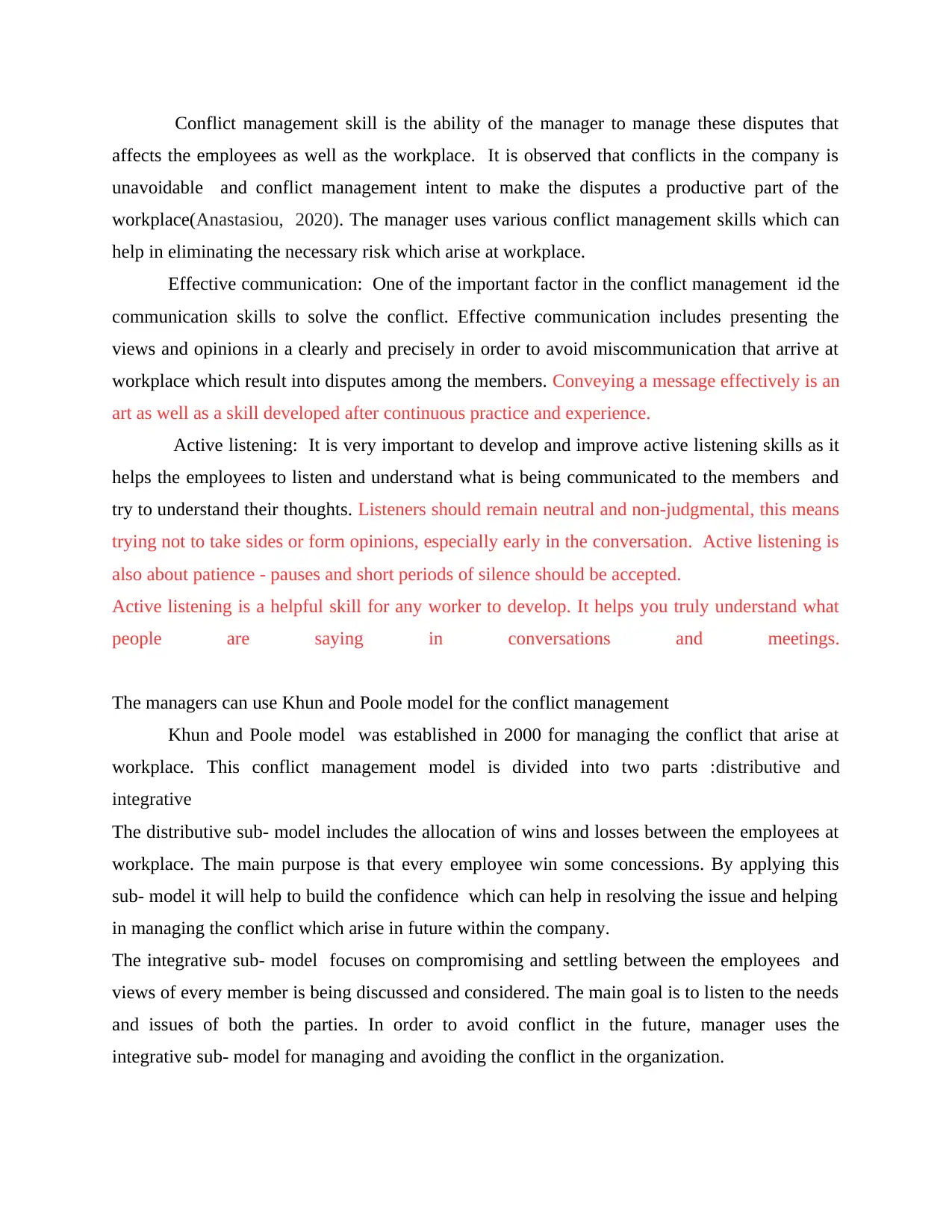
Conflict management skill is the ability of the manager to manage these disputes that
affects the employees as well as the workplace. It is observed that conflicts in the company is
unavoidable and conflict management intent to make the disputes a productive part of the
workplace(Anastasiou, 2020). The manager uses various conflict management skills which can
help in eliminating the necessary risk which arise at workplace.
Effective communication: One of the important factor in the conflict management id the
communication skills to solve the conflict. Effective communication includes presenting the
views and opinions in a clearly and precisely in order to avoid miscommunication that arrive at
workplace which result into disputes among the members. Conveying a message effectively is an
art as well as a skill developed after continuous practice and experience.
Active listening: It is very important to develop and improve active listening skills as it
helps the employees to listen and understand what is being communicated to the members and
try to understand their thoughts. Listeners should remain neutral and non-judgmental, this means
trying not to take sides or form opinions, especially early in the conversation. Active listening is
also about patience - pauses and short periods of silence should be accepted.
Active listening is a helpful skill for any worker to develop. It helps you truly understand what
people are saying in conversations and meetings.
The managers can use Khun and Poole model for the conflict management
Khun and Poole model was established in 2000 for managing the conflict that arise at
workplace. This conflict management model is divided into two parts :distributive and
integrative
The distributive sub- model includes the allocation of wins and losses between the employees at
workplace. The main purpose is that every employee win some concessions. By applying this
sub- model it will help to build the confidence which can help in resolving the issue and helping
in managing the conflict which arise in future within the company.
The integrative sub- model focuses on compromising and settling between the employees and
views of every member is being discussed and considered. The main goal is to listen to the needs
and issues of both the parties. In order to avoid conflict in the future, manager uses the
integrative sub- model for managing and avoiding the conflict in the organization.
affects the employees as well as the workplace. It is observed that conflicts in the company is
unavoidable and conflict management intent to make the disputes a productive part of the
workplace(Anastasiou, 2020). The manager uses various conflict management skills which can
help in eliminating the necessary risk which arise at workplace.
Effective communication: One of the important factor in the conflict management id the
communication skills to solve the conflict. Effective communication includes presenting the
views and opinions in a clearly and precisely in order to avoid miscommunication that arrive at
workplace which result into disputes among the members. Conveying a message effectively is an
art as well as a skill developed after continuous practice and experience.
Active listening: It is very important to develop and improve active listening skills as it
helps the employees to listen and understand what is being communicated to the members and
try to understand their thoughts. Listeners should remain neutral and non-judgmental, this means
trying not to take sides or form opinions, especially early in the conversation. Active listening is
also about patience - pauses and short periods of silence should be accepted.
Active listening is a helpful skill for any worker to develop. It helps you truly understand what
people are saying in conversations and meetings.
The managers can use Khun and Poole model for the conflict management
Khun and Poole model was established in 2000 for managing the conflict that arise at
workplace. This conflict management model is divided into two parts :distributive and
integrative
The distributive sub- model includes the allocation of wins and losses between the employees at
workplace. The main purpose is that every employee win some concessions. By applying this
sub- model it will help to build the confidence which can help in resolving the issue and helping
in managing the conflict which arise in future within the company.
The integrative sub- model focuses on compromising and settling between the employees and
views of every member is being discussed and considered. The main goal is to listen to the needs
and issues of both the parties. In order to avoid conflict in the future, manager uses the
integrative sub- model for managing and avoiding the conflict in the organization.
Paraphrase This Document
Need a fresh take? Get an instant paraphrase of this document with our AI Paraphraser
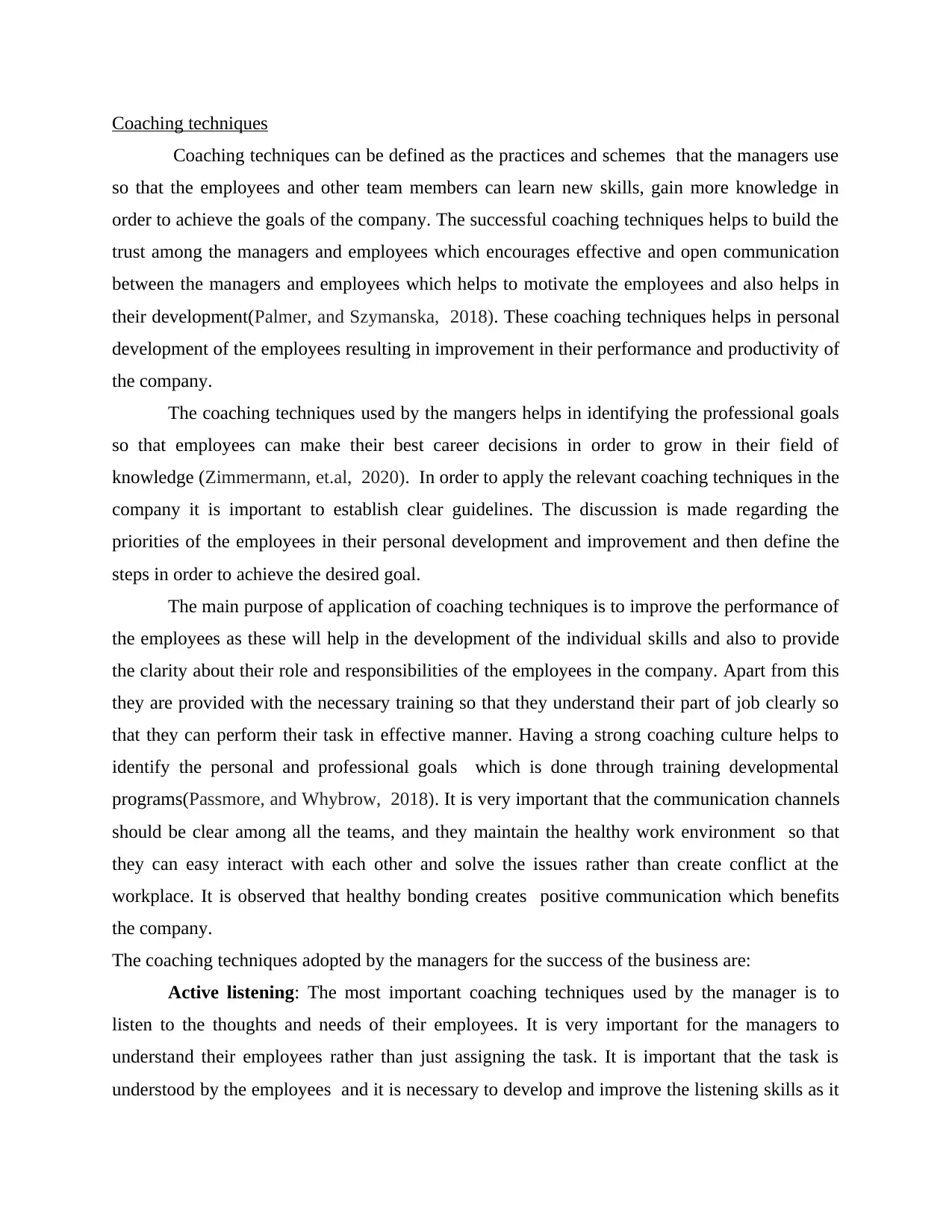
Coaching techniques
Coaching techniques can be defined as the practices and schemes that the managers use
so that the employees and other team members can learn new skills, gain more knowledge in
order to achieve the goals of the company. The successful coaching techniques helps to build the
trust among the managers and employees which encourages effective and open communication
between the managers and employees which helps to motivate the employees and also helps in
their development(Palmer, and Szymanska, 2018). These coaching techniques helps in personal
development of the employees resulting in improvement in their performance and productivity of
the company.
The coaching techniques used by the mangers helps in identifying the professional goals
so that employees can make their best career decisions in order to grow in their field of
knowledge (Zimmermann, et.al, 2020). In order to apply the relevant coaching techniques in the
company it is important to establish clear guidelines. The discussion is made regarding the
priorities of the employees in their personal development and improvement and then define the
steps in order to achieve the desired goal.
The main purpose of application of coaching techniques is to improve the performance of
the employees as these will help in the development of the individual skills and also to provide
the clarity about their role and responsibilities of the employees in the company. Apart from this
they are provided with the necessary training so that they understand their part of job clearly so
that they can perform their task in effective manner. Having a strong coaching culture helps to
identify the personal and professional goals which is done through training developmental
programs(Passmore, and Whybrow, 2018). It is very important that the communication channels
should be clear among all the teams, and they maintain the healthy work environment so that
they can easy interact with each other and solve the issues rather than create conflict at the
workplace. It is observed that healthy bonding creates positive communication which benefits
the company.
The coaching techniques adopted by the managers for the success of the business are:
Active listening: The most important coaching techniques used by the manager is to
listen to the thoughts and needs of their employees. It is very important for the managers to
understand their employees rather than just assigning the task. It is important that the task is
understood by the employees and it is necessary to develop and improve the listening skills as it
Coaching techniques can be defined as the practices and schemes that the managers use
so that the employees and other team members can learn new skills, gain more knowledge in
order to achieve the goals of the company. The successful coaching techniques helps to build the
trust among the managers and employees which encourages effective and open communication
between the managers and employees which helps to motivate the employees and also helps in
their development(Palmer, and Szymanska, 2018). These coaching techniques helps in personal
development of the employees resulting in improvement in their performance and productivity of
the company.
The coaching techniques used by the mangers helps in identifying the professional goals
so that employees can make their best career decisions in order to grow in their field of
knowledge (Zimmermann, et.al, 2020). In order to apply the relevant coaching techniques in the
company it is important to establish clear guidelines. The discussion is made regarding the
priorities of the employees in their personal development and improvement and then define the
steps in order to achieve the desired goal.
The main purpose of application of coaching techniques is to improve the performance of
the employees as these will help in the development of the individual skills and also to provide
the clarity about their role and responsibilities of the employees in the company. Apart from this
they are provided with the necessary training so that they understand their part of job clearly so
that they can perform their task in effective manner. Having a strong coaching culture helps to
identify the personal and professional goals which is done through training developmental
programs(Passmore, and Whybrow, 2018). It is very important that the communication channels
should be clear among all the teams, and they maintain the healthy work environment so that
they can easy interact with each other and solve the issues rather than create conflict at the
workplace. It is observed that healthy bonding creates positive communication which benefits
the company.
The coaching techniques adopted by the managers for the success of the business are:
Active listening: The most important coaching techniques used by the manager is to
listen to the thoughts and needs of their employees. It is very important for the managers to
understand their employees rather than just assigning the task. It is important that the task is
understood by the employees and it is necessary to develop and improve the listening skills as it
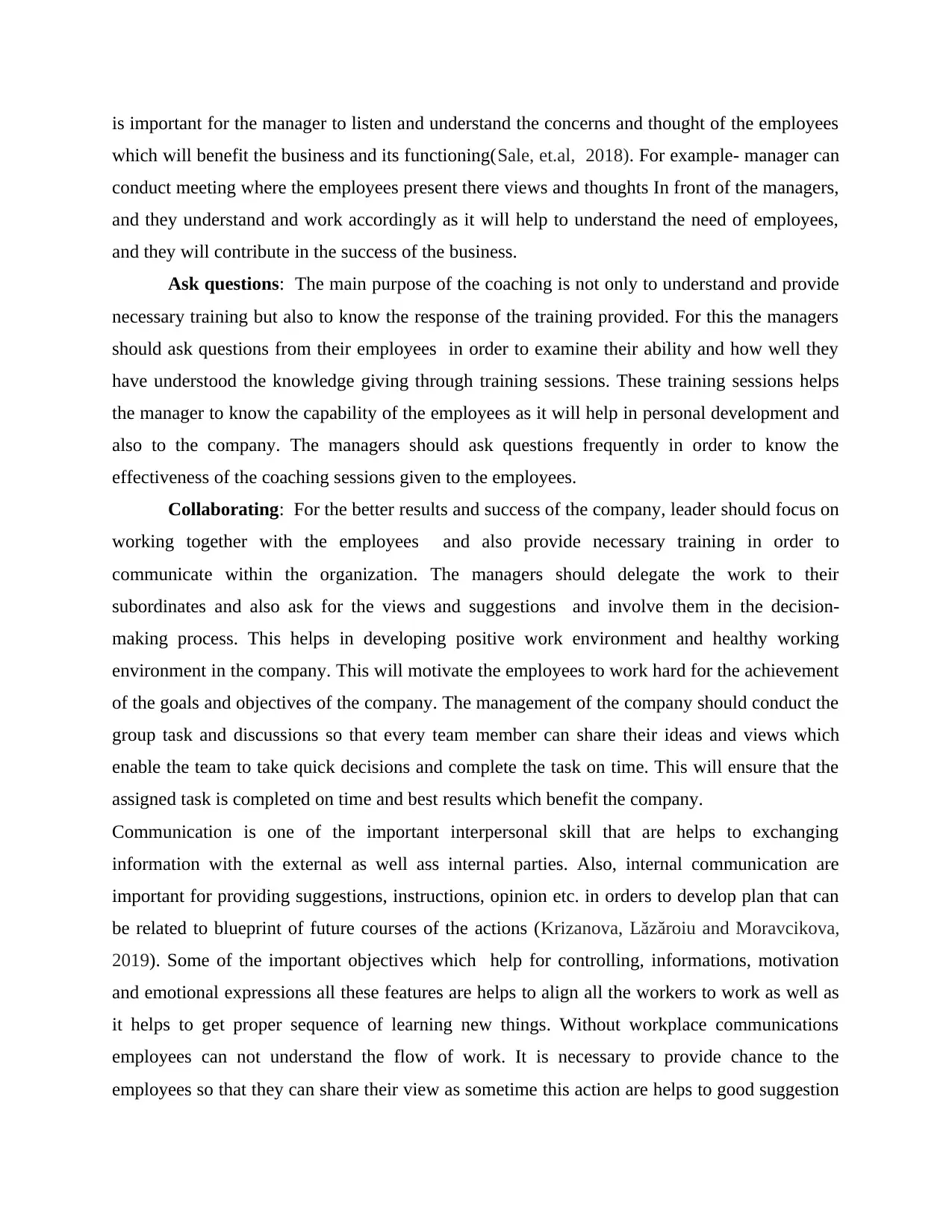
is important for the manager to listen and understand the concerns and thought of the employees
which will benefit the business and its functioning(Sale, et.al, 2018). For example- manager can
conduct meeting where the employees present there views and thoughts In front of the managers,
and they understand and work accordingly as it will help to understand the need of employees,
and they will contribute in the success of the business.
Ask questions: The main purpose of the coaching is not only to understand and provide
necessary training but also to know the response of the training provided. For this the managers
should ask questions from their employees in order to examine their ability and how well they
have understood the knowledge giving through training sessions. These training sessions helps
the manager to know the capability of the employees as it will help in personal development and
also to the company. The managers should ask questions frequently in order to know the
effectiveness of the coaching sessions given to the employees.
Collaborating: For the better results and success of the company, leader should focus on
working together with the employees and also provide necessary training in order to
communicate within the organization. The managers should delegate the work to their
subordinates and also ask for the views and suggestions and involve them in the decision-
making process. This helps in developing positive work environment and healthy working
environment in the company. This will motivate the employees to work hard for the achievement
of the goals and objectives of the company. The management of the company should conduct the
group task and discussions so that every team member can share their ideas and views which
enable the team to take quick decisions and complete the task on time. This will ensure that the
assigned task is completed on time and best results which benefit the company.
Communication is one of the important interpersonal skill that are helps to exchanging
information with the external as well ass internal parties. Also, internal communication are
important for providing suggestions, instructions, opinion etc. in orders to develop plan that can
be related to blueprint of future courses of the actions (Krizanova, Lăzăroiu and Moravcikova,
2019). Some of the important objectives which help for controlling, informations, motivation
and emotional expressions all these features are helps to align all the workers to work as well as
it helps to get proper sequence of learning new things. Without workplace communications
employees can not understand the flow of work. It is necessary to provide chance to the
employees so that they can share their view as sometime this action are helps to good suggestion
which will benefit the business and its functioning(Sale, et.al, 2018). For example- manager can
conduct meeting where the employees present there views and thoughts In front of the managers,
and they understand and work accordingly as it will help to understand the need of employees,
and they will contribute in the success of the business.
Ask questions: The main purpose of the coaching is not only to understand and provide
necessary training but also to know the response of the training provided. For this the managers
should ask questions from their employees in order to examine their ability and how well they
have understood the knowledge giving through training sessions. These training sessions helps
the manager to know the capability of the employees as it will help in personal development and
also to the company. The managers should ask questions frequently in order to know the
effectiveness of the coaching sessions given to the employees.
Collaborating: For the better results and success of the company, leader should focus on
working together with the employees and also provide necessary training in order to
communicate within the organization. The managers should delegate the work to their
subordinates and also ask for the views and suggestions and involve them in the decision-
making process. This helps in developing positive work environment and healthy working
environment in the company. This will motivate the employees to work hard for the achievement
of the goals and objectives of the company. The management of the company should conduct the
group task and discussions so that every team member can share their ideas and views which
enable the team to take quick decisions and complete the task on time. This will ensure that the
assigned task is completed on time and best results which benefit the company.
Communication is one of the important interpersonal skill that are helps to exchanging
information with the external as well ass internal parties. Also, internal communication are
important for providing suggestions, instructions, opinion etc. in orders to develop plan that can
be related to blueprint of future courses of the actions (Krizanova, Lăzăroiu and Moravcikova,
2019). Some of the important objectives which help for controlling, informations, motivation
and emotional expressions all these features are helps to align all the workers to work as well as
it helps to get proper sequence of learning new things. Without workplace communications
employees can not understand the flow of work. It is necessary to provide chance to the
employees so that they can share their view as sometime this action are helps to good suggestion
⊘ This is a preview!⊘
Do you want full access?
Subscribe today to unlock all pages.

Trusted by 1+ million students worldwide
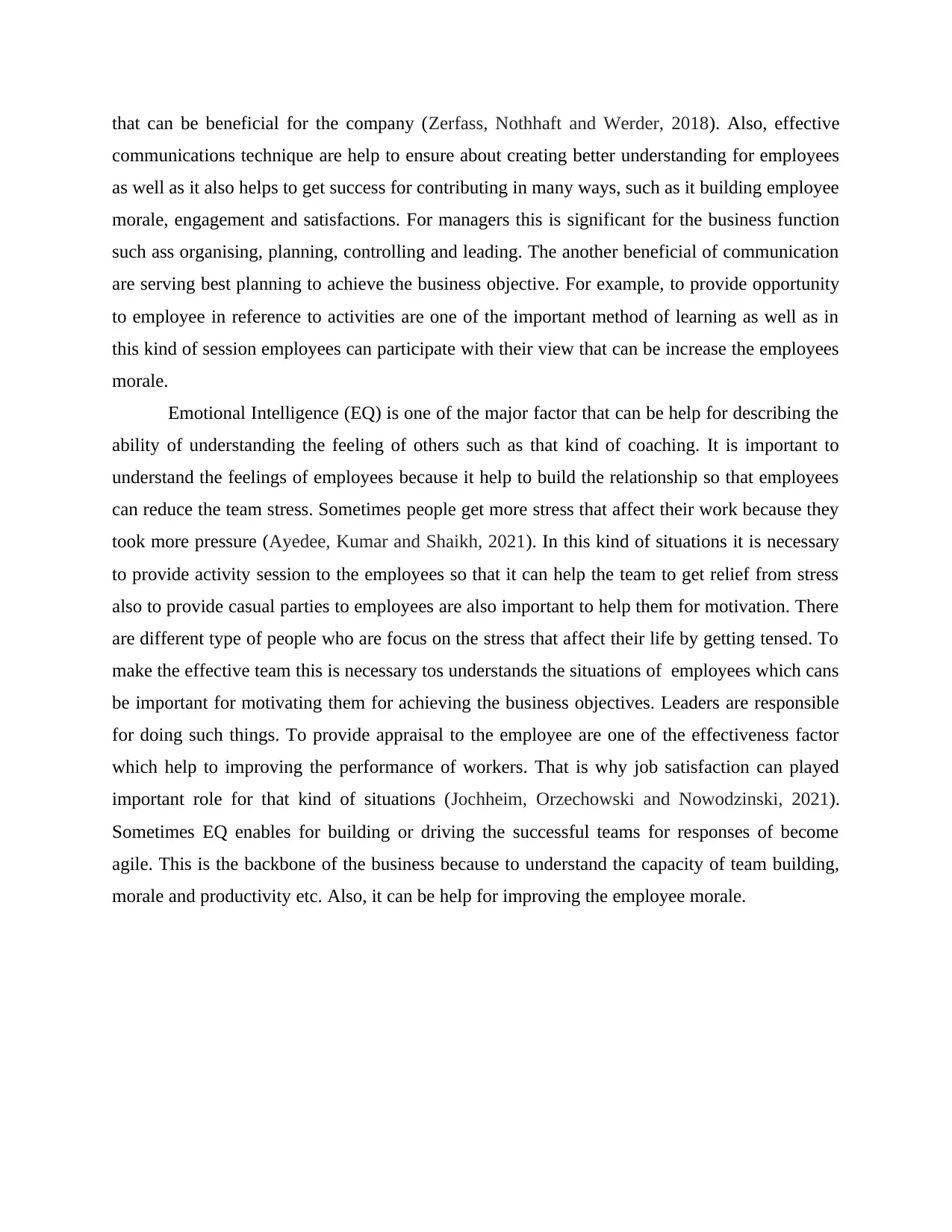
that can be beneficial for the company (Zerfass, Nothhaft and Werder, 2018). Also, effective
communications technique are help to ensure about creating better understanding for employees
as well as it also helps to get success for contributing in many ways, such as it building employee
morale, engagement and satisfactions. For managers this is significant for the business function
such ass organising, planning, controlling and leading. The another beneficial of communication
are serving best planning to achieve the business objective. For example, to provide opportunity
to employee in reference to activities are one of the important method of learning as well as in
this kind of session employees can participate with their view that can be increase the employees
morale.
Emotional Intelligence (EQ) is one of the major factor that can be help for describing the
ability of understanding the feeling of others such as that kind of coaching. It is important to
understand the feelings of employees because it help to build the relationship so that employees
can reduce the team stress. Sometimes people get more stress that affect their work because they
took more pressure (Ayedee, Kumar and Shaikh, 2021). In this kind of situations it is necessary
to provide activity session to the employees so that it can help the team to get relief from stress
also to provide casual parties to employees are also important to help them for motivation. There
are different type of people who are focus on the stress that affect their life by getting tensed. To
make the effective team this is necessary tos understands the situations of employees which cans
be important for motivating them for achieving the business objectives. Leaders are responsible
for doing such things. To provide appraisal to the employee are one of the effectiveness factor
which help to improving the performance of workers. That is why job satisfaction can played
important role for that kind of situations (Jochheim, Orzechowski and Nowodzinski, 2021).
Sometimes EQ enables for building or driving the successful teams for responses of become
agile. This is the backbone of the business because to understand the capacity of team building,
morale and productivity etc. Also, it can be help for improving the employee morale.
communications technique are help to ensure about creating better understanding for employees
as well as it also helps to get success for contributing in many ways, such as it building employee
morale, engagement and satisfactions. For managers this is significant for the business function
such ass organising, planning, controlling and leading. The another beneficial of communication
are serving best planning to achieve the business objective. For example, to provide opportunity
to employee in reference to activities are one of the important method of learning as well as in
this kind of session employees can participate with their view that can be increase the employees
morale.
Emotional Intelligence (EQ) is one of the major factor that can be help for describing the
ability of understanding the feeling of others such as that kind of coaching. It is important to
understand the feelings of employees because it help to build the relationship so that employees
can reduce the team stress. Sometimes people get more stress that affect their work because they
took more pressure (Ayedee, Kumar and Shaikh, 2021). In this kind of situations it is necessary
to provide activity session to the employees so that it can help the team to get relief from stress
also to provide casual parties to employees are also important to help them for motivation. There
are different type of people who are focus on the stress that affect their life by getting tensed. To
make the effective team this is necessary tos understands the situations of employees which cans
be important for motivating them for achieving the business objectives. Leaders are responsible
for doing such things. To provide appraisal to the employee are one of the effectiveness factor
which help to improving the performance of workers. That is why job satisfaction can played
important role for that kind of situations (Jochheim, Orzechowski and Nowodzinski, 2021).
Sometimes EQ enables for building or driving the successful teams for responses of become
agile. This is the backbone of the business because to understand the capacity of team building,
morale and productivity etc. Also, it can be help for improving the employee morale.
Paraphrase This Document
Need a fresh take? Get an instant paraphrase of this document with our AI Paraphraser
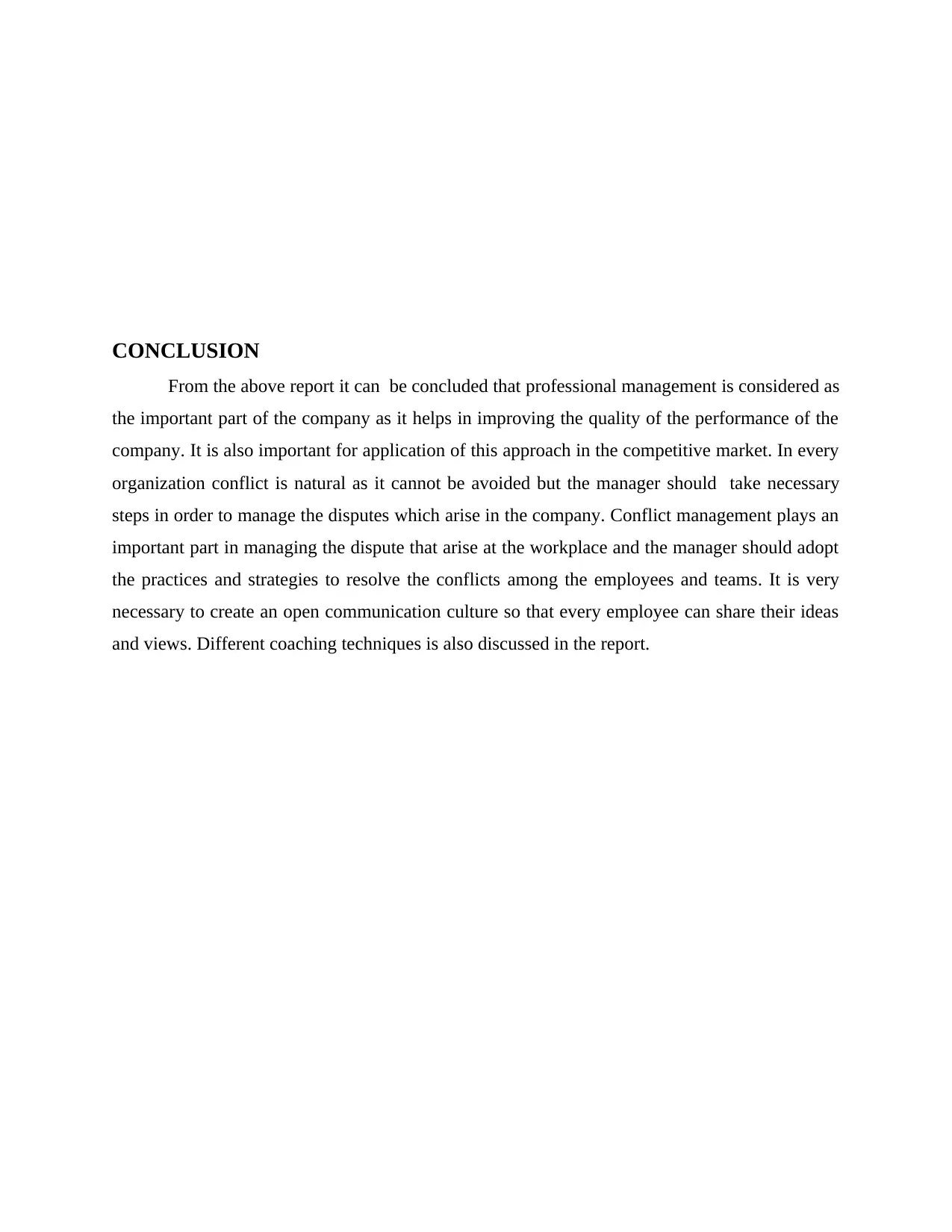
CONCLUSION
From the above report it can be concluded that professional management is considered as
the important part of the company as it helps in improving the quality of the performance of the
company. It is also important for application of this approach in the competitive market. In every
organization conflict is natural as it cannot be avoided but the manager should take necessary
steps in order to manage the disputes which arise in the company. Conflict management plays an
important part in managing the dispute that arise at the workplace and the manager should adopt
the practices and strategies to resolve the conflicts among the employees and teams. It is very
necessary to create an open communication culture so that every employee can share their ideas
and views. Different coaching techniques is also discussed in the report.
From the above report it can be concluded that professional management is considered as
the important part of the company as it helps in improving the quality of the performance of the
company. It is also important for application of this approach in the competitive market. In every
organization conflict is natural as it cannot be avoided but the manager should take necessary
steps in order to manage the disputes which arise in the company. Conflict management plays an
important part in managing the dispute that arise at the workplace and the manager should adopt
the practices and strategies to resolve the conflicts among the employees and teams. It is very
necessary to create an open communication culture so that every employee can share their ideas
and views. Different coaching techniques is also discussed in the report.
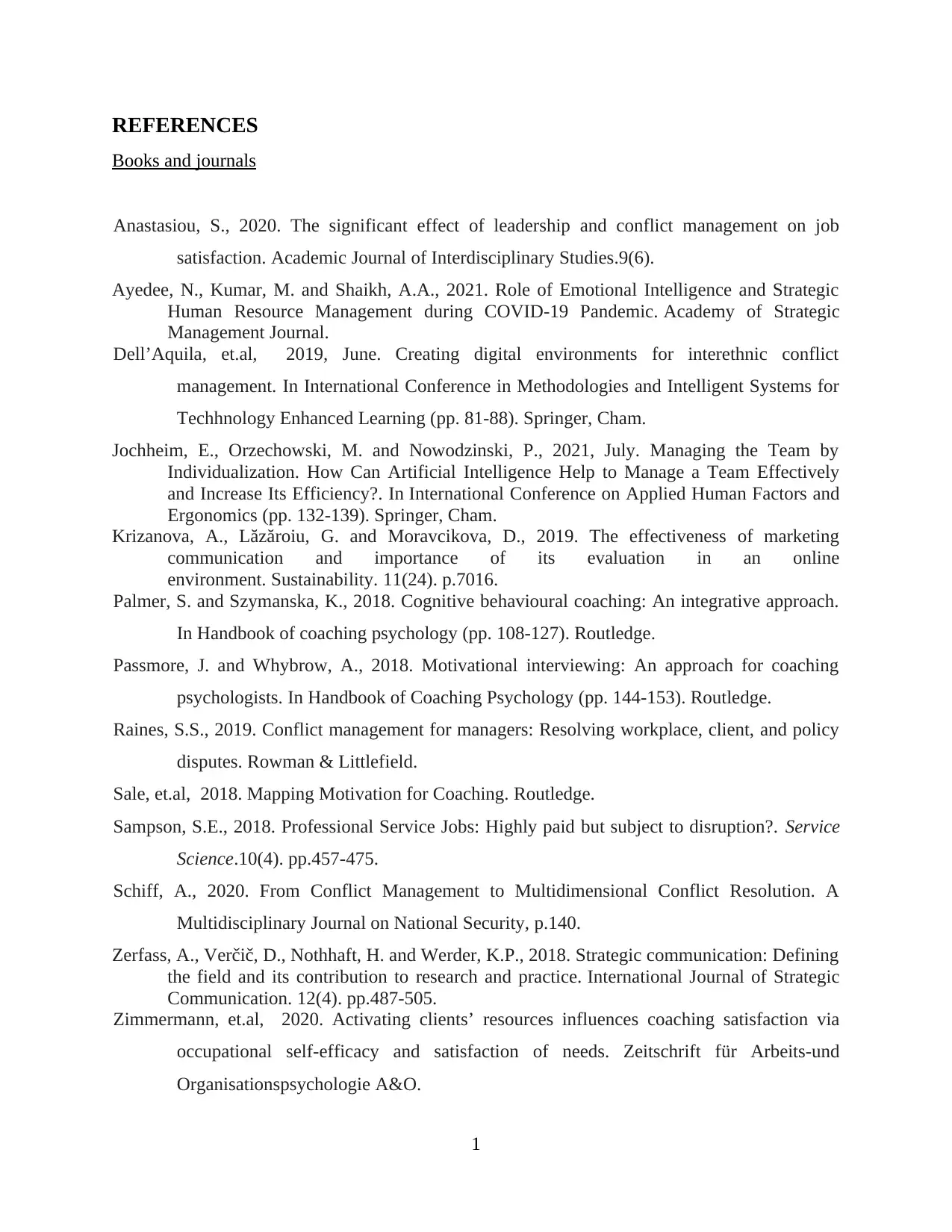
REFERENCES
Books and journals
Anastasiou, S., 2020. The significant effect of leadership and conflict management on job
satisfaction. Academic Journal of Interdisciplinary Studies.9(6).
Ayedee, N., Kumar, M. and Shaikh, A.A., 2021. Role of Emotional Intelligence and Strategic
Human Resource Management during COVID-19 Pandemic. Academy of Strategic
Management Journal.
Dell’Aquila, et.al, 2019, June. Creating digital environments for interethnic conflict
management. In International Conference in Methodologies and Intelligent Systems for
Techhnology Enhanced Learning (pp. 81-88). Springer, Cham.
Jochheim, E., Orzechowski, M. and Nowodzinski, P., 2021, July. Managing the Team by
Individualization. How Can Artificial Intelligence Help to Manage a Team Effectively
and Increase Its Efficiency?. In International Conference on Applied Human Factors and
Ergonomics (pp. 132-139). Springer, Cham.
Krizanova, A., Lăzăroiu, G. and Moravcikova, D., 2019. The effectiveness of marketing
communication and importance of its evaluation in an online
environment. Sustainability. 11(24). p.7016.
Palmer, S. and Szymanska, K., 2018. Cognitive behavioural coaching: An integrative approach.
In Handbook of coaching psychology (pp. 108-127). Routledge.
Passmore, J. and Whybrow, A., 2018. Motivational interviewing: An approach for coaching
psychologists. In Handbook of Coaching Psychology (pp. 144-153). Routledge.
Raines, S.S., 2019. Conflict management for managers: Resolving workplace, client, and policy
disputes. Rowman & Littlefield.
Sale, et.al, 2018. Mapping Motivation for Coaching. Routledge.
Sampson, S.E., 2018. Professional Service Jobs: Highly paid but subject to disruption?. Service
Science.10(4). pp.457-475.
Schiff, A., 2020. From Conflict Management to Multidimensional Conflict Resolution. A
Multidisciplinary Journal on National Security, p.140.
Zerfass, A., Verčič, D., Nothhaft, H. and Werder, K.P., 2018. Strategic communication: Defining
the field and its contribution to research and practice. International Journal of Strategic
Communication. 12(4). pp.487-505.
Zimmermann, et.al, 2020. Activating clients’ resources influences coaching satisfaction via
occupational self-efficacy and satisfaction of needs. Zeitschrift für Arbeits-und
Organisationspsychologie A&O.
1
Books and journals
Anastasiou, S., 2020. The significant effect of leadership and conflict management on job
satisfaction. Academic Journal of Interdisciplinary Studies.9(6).
Ayedee, N., Kumar, M. and Shaikh, A.A., 2021. Role of Emotional Intelligence and Strategic
Human Resource Management during COVID-19 Pandemic. Academy of Strategic
Management Journal.
Dell’Aquila, et.al, 2019, June. Creating digital environments for interethnic conflict
management. In International Conference in Methodologies and Intelligent Systems for
Techhnology Enhanced Learning (pp. 81-88). Springer, Cham.
Jochheim, E., Orzechowski, M. and Nowodzinski, P., 2021, July. Managing the Team by
Individualization. How Can Artificial Intelligence Help to Manage a Team Effectively
and Increase Its Efficiency?. In International Conference on Applied Human Factors and
Ergonomics (pp. 132-139). Springer, Cham.
Krizanova, A., Lăzăroiu, G. and Moravcikova, D., 2019. The effectiveness of marketing
communication and importance of its evaluation in an online
environment. Sustainability. 11(24). p.7016.
Palmer, S. and Szymanska, K., 2018. Cognitive behavioural coaching: An integrative approach.
In Handbook of coaching psychology (pp. 108-127). Routledge.
Passmore, J. and Whybrow, A., 2018. Motivational interviewing: An approach for coaching
psychologists. In Handbook of Coaching Psychology (pp. 144-153). Routledge.
Raines, S.S., 2019. Conflict management for managers: Resolving workplace, client, and policy
disputes. Rowman & Littlefield.
Sale, et.al, 2018. Mapping Motivation for Coaching. Routledge.
Sampson, S.E., 2018. Professional Service Jobs: Highly paid but subject to disruption?. Service
Science.10(4). pp.457-475.
Schiff, A., 2020. From Conflict Management to Multidimensional Conflict Resolution. A
Multidisciplinary Journal on National Security, p.140.
Zerfass, A., Verčič, D., Nothhaft, H. and Werder, K.P., 2018. Strategic communication: Defining
the field and its contribution to research and practice. International Journal of Strategic
Communication. 12(4). pp.487-505.
Zimmermann, et.al, 2020. Activating clients’ resources influences coaching satisfaction via
occupational self-efficacy and satisfaction of needs. Zeitschrift für Arbeits-und
Organisationspsychologie A&O.
1
⊘ This is a preview!⊘
Do you want full access?
Subscribe today to unlock all pages.

Trusted by 1+ million students worldwide

2
1 out of 10
Related Documents
Your All-in-One AI-Powered Toolkit for Academic Success.
+13062052269
info@desklib.com
Available 24*7 on WhatsApp / Email
![[object Object]](/_next/static/media/star-bottom.7253800d.svg)
Unlock your academic potential
Copyright © 2020–2026 A2Z Services. All Rights Reserved. Developed and managed by ZUCOL.




